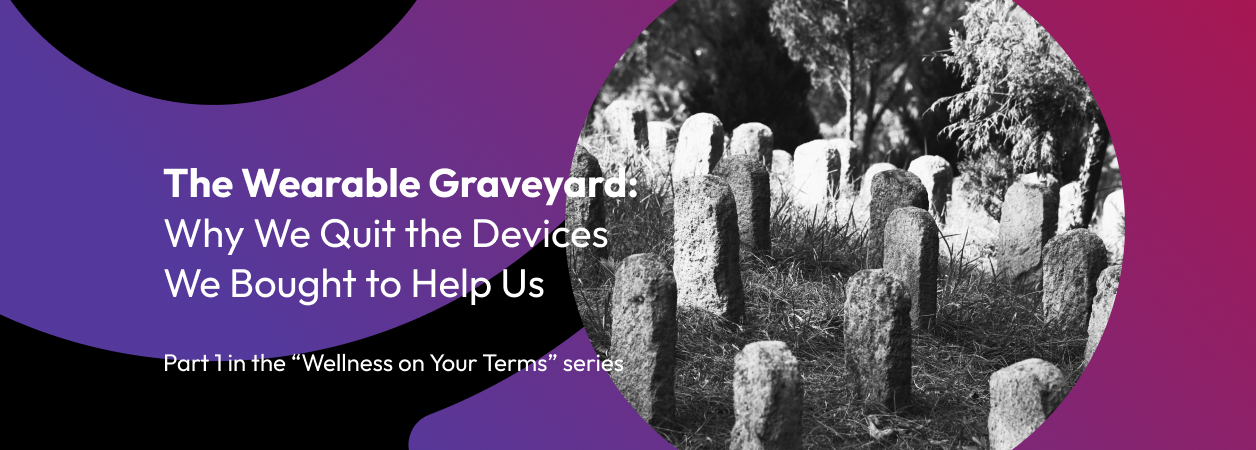You know where yours is. Maybe it's in the back of a drawer, tangled with old charging cables. Maybe it's on your desk, battery dead for months. Or maybe you gave it away, told someone else they could have better luck with it than you did.
The fitness tracker you bought with such good intentions. The one that was supposed to help you get healthier, stay motivated, finally crack the code on whatever wellness goal had been nagging at you. The one that cost real money and came with real hope.
And now it just sits there. A reminder of intentions that didn't quite work out - yours, theirs, it's hard to say.
I've been thinking about this graveyard lately. Not because I'm interested in making you feel guilty about one more thing (we have enough of that), but because I think we've been blaming the wrong culprit. For too long, the narrative has been about your willpower. Your commitment. Your follow-through.
But what if it was never about you at all?
The Creeping Surveillance Feeling
Here's what I hear from people who've abandoned their devices: that creeping feeling that something was off. Not the device itself - the physical thing was fine, mostly. But that gradual realization that their body was being watched. Measured. Scored. And they had no idea what was happening with all that intimate data once it left their wrist. This isn't paranoia. It's pattern recognition.
When you're young, invincible, tracking your marathon training - maybe you don't think about it much. But at 45, 50, 55? When the data gets more complicated, when it intersects with health concerns you're actually worried about, when it feels less like fitness and more like surveillance of your aging body? That hits different. There is a name for this that we don't talk about much: the ick factor. That gut-level response when you start to understand how much a device knows about you, where that data goes, and who profits from it.
But here's the thing: the ick factor alone doesn't explain what's happening in all those drawers. Because plenty of people never get to the surveillance worry. They quit long before that, when the daily experience of using the device just stops making sense. They quit because the device loses relevance.
When Tools Stop Fitting Your Life
Studies confirm what our drawers already tell us: nearly 40% of trackers are abandoned within six months.
The standard explanation? We lack motivation. We’re not committed. We didn't want it badly enough.
But I know too many people who desperately wanted these devices to work. Who bought them during a health scare, or a major life transition, or just because they were tired of feeling disconnected from their own bodies. These weren't whims. These were investments - financial and emotional.
So what actually breaks?
The device loses relevance. Not all at once, but through small mismatches that compound.
I watched a friend try on a new tracker last year. She was smart, capable, and genuinely motivated to understand her health better in her 50s. The device was too big. Not unusable... just big enough that she couldn't imagine wearing it regularly with the clothes she wears to work. She returned it. Not because she gave up on wellness. Because the device gave up on fitting her life.
This happens in layers. The band that irritates your skin by day three. The charging ritual that becomes one more task in your daily litany of tasks. The metrics that celebrate yesterday's step count when you're trying to understand recovery patterns over weeks. The cartoon badges that feel patronizing when you're 50—more like homework than motivation.
I'm a power user. I'll spend hours restructuring an app, buy different bands, customize every setting to translate the device's priorities into my own. But most people shouldn't have to work that hard. And the ones who quit aren't lazy. They're rational.
This is the real problem: these devices are built on assumptions about motivation, bodies, and goals that map to a narrow slice of users. Young. Athletic. Driven by competition and external validation. But research tells us that motivation shifts with age. It becomes more intrinsic, more about autonomy and capability, and the devices, simply, don't adapt.
The Long Arc
Here's what I think is really happening: these devices aren't designed for the long game. They're designed for fitness cycles: three months of training, six months of weight loss, or maybe a year of "getting in shape." They are made for short bursts of intense engagement, measured in closed rings and completed challenges. Those tools are built for sprinters. But midlife needs a sherpa.
And the mismatch goes deeper than time horizons. We're deeply motivated by health and capacity at this stage -just not by the same things that worked at 25. Daily streaks and competitive leaderboards don't speak to someone trying to maintain independence over decades. Cartoon badges don't connect to the authentic drive to keep traveling, keep moving, keep showing up for the people and activities that matter.
What actually connects at this stage of life is understanding. Not yesterday's step count -but noticing that averaging two miles of walking daily seems to correlate with how sharp you feel. Not today's sleep score - but catching that your recovery patterns have shifted over the past month in ways that might mean something. Not a ring you closed—but understanding when your balance is changing before it becomes a problem.
Maybe it's time to stop blaming ourselves for the devices in our drawers and start asking different questions. Not "why can't I stick with this?" - but "what would I actually want from a tool I'd use for a decade?" Not "what's wrong with my willpower?", but "what kind of understanding would help me make choices that align with how I want to age?"
What would it take for wellness technology to feel like it belongs in your life for the long haul?
